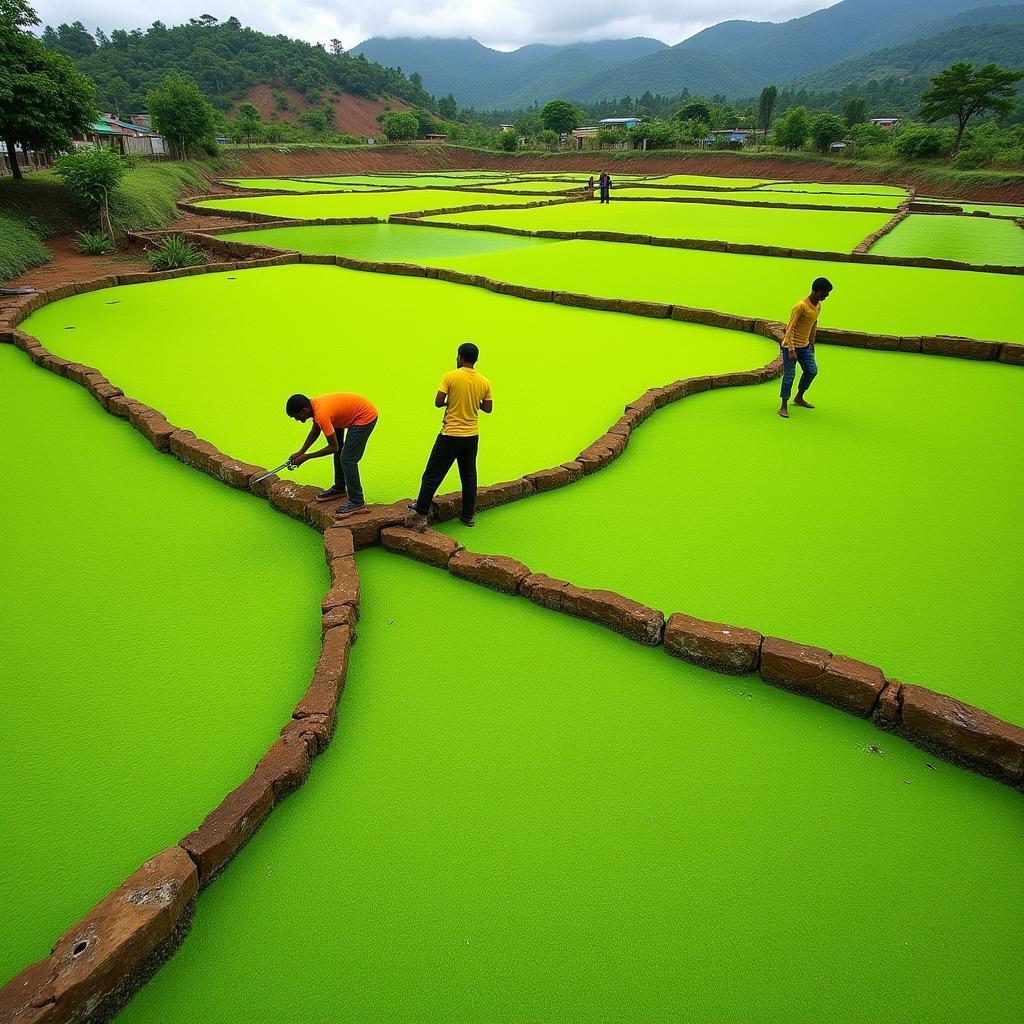Unlocking the Power of African Algae Super Food
African Algae Super Food is gaining recognition worldwide for its incredible nutritional profile and potential health benefits. From the spirulina farms of East Africa to the diverse aquatic ecosystems across the continent, algae is emerging as a sustainable and powerful source of nutrients. This article delves into the world of African algae, exploring its various types, nutritional benefits, and the impact it’s making on local communities and the global food scene.
Exploring the Nutritional Powerhouse of African Algae Super Food
African algae boasts an impressive nutritional profile, packed with essential vitamins, minerals, and antioxidants that are vital for maintaining optimal health.  Spirulina farm in East Africa showing the cultivation process. It’s a rich source of protein, making it a valuable addition to vegetarian and vegan diets. Certain species are also high in omega-3 fatty acids, crucial for brain health and reducing inflammation. Moreover, African algae is a significant source of iron, an essential mineral often lacking in many diets worldwide.
Spirulina farm in East Africa showing the cultivation process. It’s a rich source of protein, making it a valuable addition to vegetarian and vegan diets. Certain species are also high in omega-3 fatty acids, crucial for brain health and reducing inflammation. Moreover, African algae is a significant source of iron, an essential mineral often lacking in many diets worldwide.
Types of African Algae Super Food and Their Unique Benefits
Different types of algae offer unique benefits. Spirulina, a blue-green algae, is renowned for its high protein content and antioxidant properties. Chlorella, another popular variety, is rich in chlorophyll and supports detoxification.  Chlorella algae viewed under a powerful microscope A lesser-known algae, Aphanizomenon flos-aquae, found in certain African lakes, is being studied for its potential cognitive-enhancing effects. The diverse range of algae species across the continent makes it a treasure trove of nutritional possibilities.
Chlorella algae viewed under a powerful microscope A lesser-known algae, Aphanizomenon flos-aquae, found in certain African lakes, is being studied for its potential cognitive-enhancing effects. The diverse range of algae species across the continent makes it a treasure trove of nutritional possibilities.
African Algae: A Sustainable Food Source for the Future
Beyond its nutritional value, African algae is a sustainable food source with a minimal environmental footprint. Its cultivation requires less land and water compared to traditional crops, making it an eco-friendly alternative in arid and semi-arid regions. It can also be grown in a variety of environments, from freshwater lakes to saltwater ponds, adding to its versatility.
The Impact of Algae Farming on African Communities
Algae farming is empowering local communities in Africa by providing economic opportunities and improving food security. african clawed fish It offers a sustainable livelihood, especially in rural areas where employment opportunities may be limited. The cultivation process is relatively simple and can be easily adopted by local farmers, contributing to economic growth and self-sufficiency.
Incorporating African Algae into Your Diet
Adding African algae to your diet is surprisingly easy. It’s available in various forms, including powder, tablets, and capsules. Spirulina powder can be added to smoothies, juices, or even baked goods. Chlorella tablets can be taken as a dietary supplement. Experiment with different recipes and find what works best for you.
Tips for Choosing and Using African Algae Products
When choosing algae products, look for reputable brands that prioritize sustainable harvesting and processing methods. Start with small amounts and gradually increase your intake to avoid any potential digestive discomfort.
“African algae is a true gift from nature,” says Dr. Fatima Hassan, a leading nutritionist based in Nairobi, Kenya. “Its incredible nutrient density and sustainable production make it an ideal food for a healthier future.”
Conclusion
African algae super food holds immense potential for improving nutrition and promoting sustainability. From its diverse nutritional benefits to its positive impact on local communities, algae is a valuable resource worth exploring. Incorporating this superfood into your diet can not only enhance your health but also contribute to a more sustainable future.
“The versatility of African algae is remarkable,” adds Dr. Abimbola Adebayo, a food scientist specializing in algae research. “It offers a wide range of culinary possibilities and can be adapted to suit various dietary needs.”
“I’ve seen firsthand the transformative power of algae farming in rural communities,” shares Mr. Joseph Mwangi, an algae farmer from Tanzania. “It’s not just about improving nutrition; it’s about empowering people and building a better future.”
FAQ
- Is African algae safe to consume?
- What are the potential side effects of consuming algae?
- How can I incorporate algae into my daily diet?
- Where can I buy African algae products?
- Are there any drug interactions I should be aware of?
- What is the recommended daily intake of algae?
- Are there any specific benefits for athletes?
Need more information? Consider reading about african clawed fish.
When needing support, contact us via Phone: +255768904061, Email: kaka.mag@gmail.com or visit our address: Mbarali DC Mawindi, Kangaga, Tanzania. We have a 24/7 customer service team.


